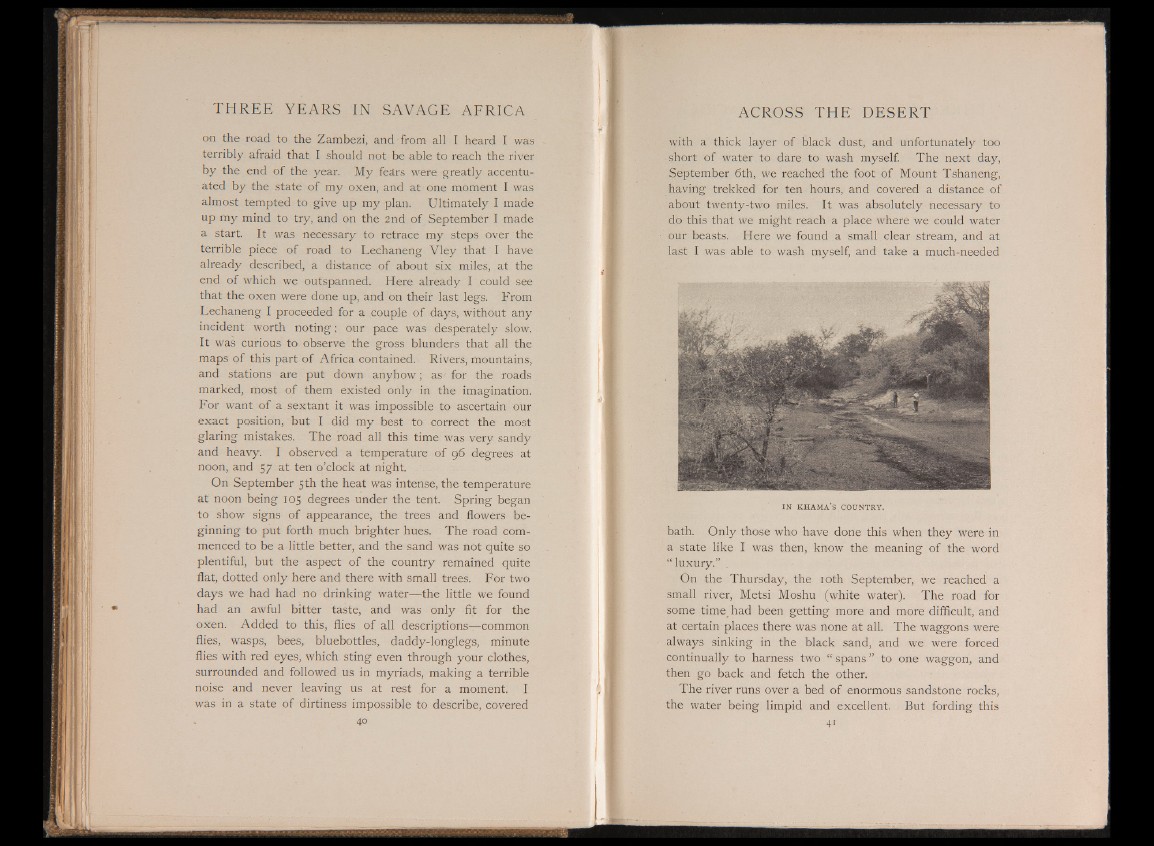
on the road to the Zambezi, and from all I heard I was
terribly afraid that I should not be able to reach the river
by the end of the year. My fears were greatly accentuated
by the state of my oxen, and at one moment I was
almost tempted to give up my plan. Ultimately I made
up my mind to try, and on the 2nd of September I made
a start. It was necessary to retrace my steps over the
terrible piece of road to Lechaneng Vley that I have
already described, a distance of about six miles, at the
end of which we outspanned. Here already I could see
that the oxen were done up, and on their last legs. From
Lechaneng I proceeded for a couple of days, without any
incident worth noting; our pace was desperately slow.
It was curious to observe the gross blunders that all the
maps of this part of Africa contained. Rivers, mountains,
and stations are put down anyhow; as for the roads
marked, most of them existed only in the imagination.
For want of a sextant it was impossible to ascertain our
exact position, but I did my best to correct the most
glaring mistakes. The road all this time was very sandy
and heavy. I observed a temperature of 96 degrees at
noon, and 57 at ten o’clock at night.
On September 5 th the heat was intense, the temperature
at noon being 105 degrees under the tent. Spring began
to show signs of appearance, the trees and flowers beginning
to put forth much brighter hues. The road commenced
to be a little better, and the sand was not quite so
plentiful, but the aspect of the country remained quite
flat, dotted only here and there with small trees. For two
days we had had no drinking water—the little we found
had an awful bitter taste, and was only fit for the
oxen. Added to this, flies of all descriptions—common
flies, wasps, bees, bluebottles, daddy-longlegs, minute
flies with red eyes, which sting even through your clothes,
surrounded and followed us in myriads, making a terrible
noise and never leaving us at rest for a moment. I
was in a state of dirtiness impossible to describe, covered
40
with a thick layer of black dust, and unfortunately too
short of water to dare to wash myself. The next day,
September 6th, we reached the foot of Mount Tshaneng,
having trekked for ten hours, and covered a distance of
about twenty-two miles. It was absolutely necessary to
do this that we might reach a place where we could water
our beasts. Here we found a small clear stream, and at
last I was able to wash myself, and take a much-needed
in k h a m a ’ s c o u n t r y .
bath. Only those who have done this when they were in
a state like I was then, know the meaning of the word
“ luxury.”
On the Thursday, the 10th September, we reached a
small river, Metsi Moshu (white water). The road for
some time had been getting more and more difficult, and
at certain places there was none at all. The waggons were
always sinking in the black sand, and we were forced
continually to harness two “ spans” to one waggon, and
then go back and fetch the other.
The river runs over a bed of enormous sandstone rocks,
the water being limpid and excellent. But fording this